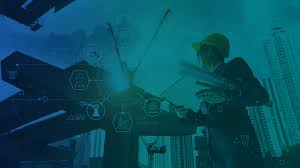In the era of rapid technological progress, Artificial Intelligence is acting as the driving force behind transformative shifts across many different industrial spheres. The construction industry, generally recognized for its traditional processes, is now undergoing a major paradigm shift due to AI technologies. When it comes to AI in construction, the technologies being offered are boosting efficiency, security, and sustainability, making construction projects smarter and less-costlier. In this blog post, we will dive into the far-reaching impact of AI on the construction industry, delving deep into the multitude of ways it is revolutionizingthe world around us.
1. Perfecting Project Management
Smartly managed project management is a foundational pillar of successful construction assignments. AI algorithms scrutinize large quantities of project intel, assisting in project scheduling, cost calculations, and risk assessment. By highlighting trends and predicting potential delays or cost overruns, AI enables project managers to make data-driven decisions, ensuring projects are in flow and delivered within the allotted timeframes.
AI development services also optimize teamwork and collaboration by providing a centralized platform for stakeholders to share real-time project updates and feedback. This creates a transparent and honest work environment and streamlines project coordination, ultimately culminating in faster and more accurate decision-making.
2. Improving Safety on Construction Sites
Safety is a major issue in the construction field. AI-enabled sensors and cameras are being utilized in the surveillance of construction sites to identify imminent hazards in real–time. From detecting unsafe worker behaviour to spotting equipment malfunctions which can result in disasters, AI can proactively safeguard against accidents and further fortify overall safety protocols.
Additionally, AI algorithms can predict potential safety risks by analyzing historical data, a feature which empowers companies to carry out proactive measures rather than reacting to the consequence of workplace disasters. Thus, by prioritizing safety, AI not only safeguards workers but also reduces project delays and associated costs to a minimum.
3. Altering Design and Strategizing
AI is also changing the way designs are taken from concept to execution. Generative design, an AI-powered process, studies many different design permutations based on pre-set conditions. This allows architects and engineers to create designs focusing on efficiency, cost-effectiveness, and sustainability.
Incorporating AI in design also enables Building Information Modeling (BIM), a 3D model-based process that provides insights into the entire lifecycle of a project. BIM, driven by AI, allows for improved visualization, coordination, and simulation, creating more accurate designs and project outcome predictions.
4. Bettering Equipment and Fleet Handling
AI-driven predictive maintenance is greatly improving equipment and fleet management in the construction sphere. By scrutinizing data supplied from sensors on machinery, AI can predict when maintenance is needed, and thus minimize downtime and boost operational efficiency.
Moreover, AI algorithms minimizes redundant equipment usage by assessing usage patterns and advising on the most efficient deployment plans. This not only minimizes operational costs but also prolongs the lifespan of machinery, adding to construction process sustainability.
5. Creating Sustainability and Efficiency
Sustainability is growing day-by-day to become a major global issue, and the construction industry is no exception. AI has made productive inroads into sustainable construction practices by optimizing energy usage, waste minimization, and material consumption. AI-driven algorithms can pore through energy utilization patterns and come up with energy-efficient alternatives, thereby promoting construction projects which are environmentally-friendly, or have a minimal impact on environmental degradation.
Additionally, AI assists in streamlining the supply chain by forecasting material requirements, reducing excess inventory, and putting a cap on total wastage. This results in cost savings and a considerable drop in the industry’s environmental footprint.
6. Enabling smarter Inspections and Quality Control
AI-enabled drones and robots have dramatically altered construction inspections. These autonomous devices can navigate construction sites, and supply high-resolution images and videos. AI algorithms can then analyze this intel to pinpoint defects, any deviations from plans, or any other other quality deviations.
This automated inspection process is not only swifter but also more precise, ensuring that construction projects adhere to specific quality standards. By quickly pinpointing and rectifying defects, AI reduces rework, saving a firm precious time and resources.
7. Allowing for Remote Monitoring and Teamwork
The ability to collaborate and work remotely in teams has become extremely vital in recent times. AI enables remote project management through delivering access to various data points, permitting stakeholders to stay updated about the project’s status without being physically present at the setting.
AI-driven teamwork facilitation tools skyrocket communication, allowing for virtual meetings and shared project updates. This not only minimizes travel and its related costs but also maintains a global talent pool, granting construction firms an opportunity to tap into expertise from around the globe.
Liquid Technologies is a growing tech-consultancy that has already established a stellar reputation for itself with its ingenuous use of Video Analytics. By harnessing the power of AI coupled with Video Intelligence Platforms, Liqteq has helped numerous construction firms adhere to safety regulations, avoid hazardous working environments, and thus create a productive and friendly working space for their employees.
Conclusion
Artificial Intelligence is not simply a trite buzzword; it’s a revolutionary wave that’s recreating the construction industry. From perfecting project management to further fortifying safety, and increasing sustainability and efficiency, AI’s mark upon the world will not be a small one. The benefits it can offer are massive– cost savings, reduced project timelines, protected safety records, and more sustainable processes. As AI continues to evolve and rise, embracing its potential in construction is no longer an option but a necessity if firms want to be ready for the future. Those who adapt and ride the waves of change with AI will head the future of construction, creating a built environment that’s smarter, safer, and more sustainable than any we have witnessed before.


